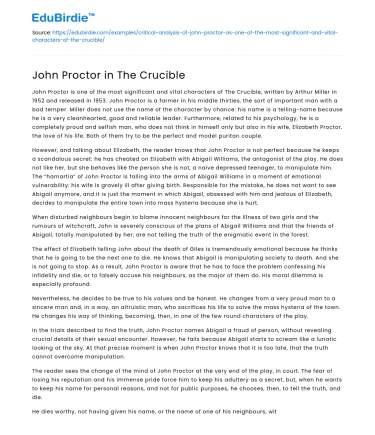John Proctor is one of the most significant and vital characters of The Crucible, written by Arthur Miller in 1952 and released in 1953. John Proctor is a farmer in his middle thirties, the sort of important man with a bad temper. Miller does not use the name of the character by chance: his name is a telling-name because he is a very cleanhearted, good and reliable leader. Furthermore, related to his psychology, he is a completely proud and selfish man, who does not think in himself only but also in his wife, Elizabeth Proctor, the love of his life. Both of them try to be the perfect and model puritan couple.
However, and talking about Elizabeth, the reader knows that John Proctor is not perfect because he keeps a scandalous secret: he has cheated on Elizabeth with Abigail Williams, the antagonist of the play. He does not like her, but she behaves like the person she is not, a naive depressed teenager, to manipulate him. The “hamartia” of John Proctor is falling into the arms of Abigail Williams in a moment of emotional vulnerability: his wife is gravely ill after giving birth. Responsible for the mistake, he does not want to see Abigail anymore, and it is just the moment in which Abigail, obsessed with him and jealous of Elizabeth, decides to manipulate the entire town into mass hysteria because she is hurt.
Save your time!
We can take care of your essay
- Proper editing and formatting
- Free revision, title page, and bibliography
- Flexible prices and money-back guarantee
When disturbed neighbours begin to blame innocent neighbours for the illness of two girls and the rumours of witchcraft, John is severely conscious of the plans of Abigail Williams and that the friends of Abigail, totally manipulated by her, are not telling the truth of the enigmatic event in the forest.
The effect of Elizabeth telling John about the death of Giles is tremendously emotional because he thinks that he is going to be the next one to die. He knows that Abigail is manipulating society to death. And she is not going to stop. As a result, John Proctor is aware that he has to face the problem confessing his infidelity and die, or to falsely accuse his neighbours, as the major of them do. His moral dilemma is especially profound.
Nevertheless, he decides to be true to his values and be honest. He changes from a very proud man to a sincere man and, in a way, an altruistic man, who sacrifices his life to solve the mass hysteria of the town. He changes his way of thinking, becoming, then, in one of the few round characters of the play.
In the trials described to find the truth, John Proctor names Abigail a fraud of person, without revealing crucial details of their sexual encounter. However, he fails because Abigail starts to scream like a lunatic looking at the sky. At that precise moment is when John Proctor knows that it is too late, that the truth cannot overcome manipulation.
The reader sees the change of the mind of John Proctor at the very end of the play, in court. The fear of losing his reputation and his immense pride force him to keep his adultery as a secret, but, when he wants to keep his name for personal reasons, and not for public purposes, he chooses, then, to tell the truth, and die.
He dies worthy, not having given his name, or the name of one of his neighbours, with dignity. He does not sign the paper to accuse anyone, and dies with his name clean, although they have taken his soul away, as he said.
Returning to the author of the play, Arthur Miller, the reader can trace parallelisms between him and John Proctor. Both were men arrested in trials and forced to say the names of innocent people to adapt to a very authoritarian puritan society. Arthur Miller reads about the madness felt in the town of Salem in 1692, and decides, in 1953, to extrapolate his feelings with John Proctor individually and his experience in America in the 1950s during the Cold War with Russia in a unique general way.
In conclusion, John Proctor is one of the most important characters of the play because, apart from being the tragic hero and the most harmed for the manipulation of Abigail Williams, he is human, teaching the reader that people make mistakes because they have moments of weakness, that sincere people have no place in a manipulated society, that good people never live to tell the tale.






 Stuck on your essay?
Stuck on your essay?

